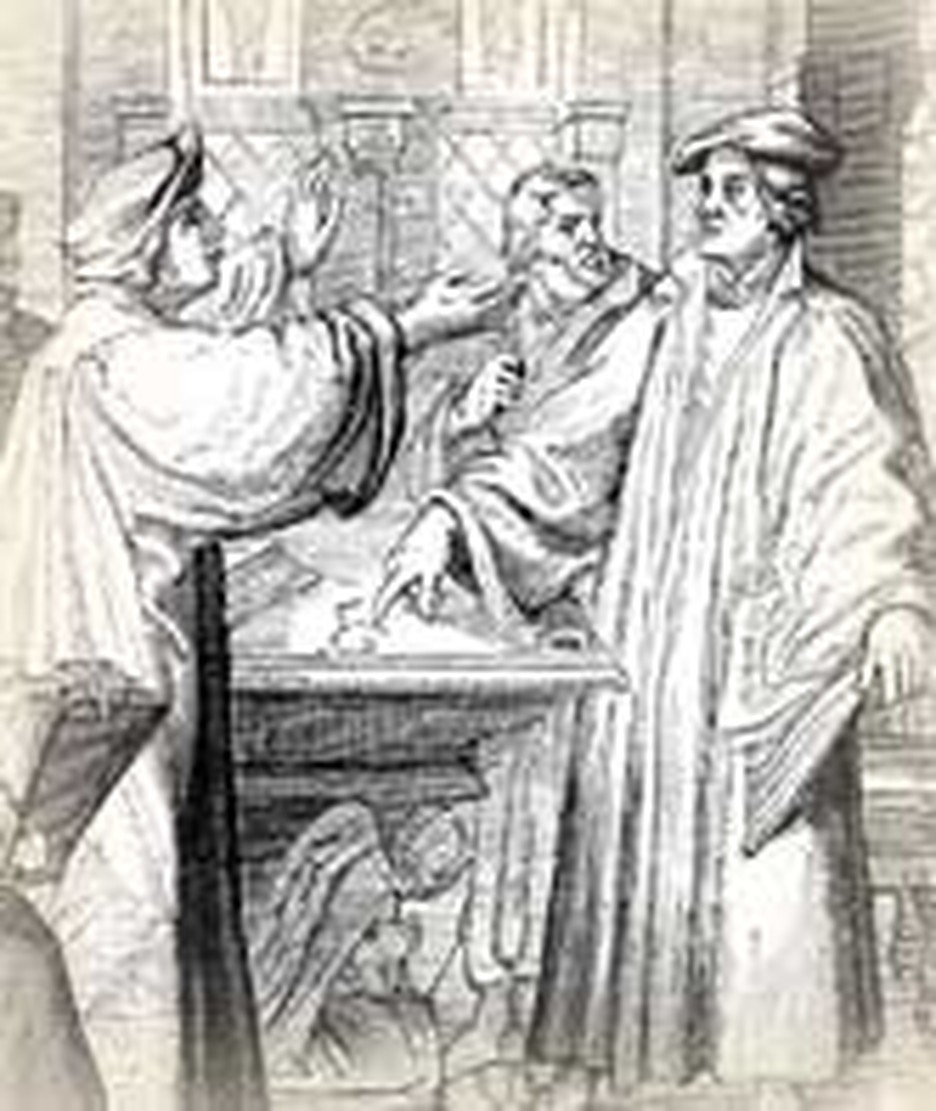
From the earliest days of the church, differences have arisen over how the Scriptures are to be interpreted. For example, Paul's teaching of salvation apart from the law of Moses was offensive at first to some of the Christian leaders in Jerusalem, all of them Jews, but after a meeting and discussion together, they came to a decision which would allow Paul's work among the Gentiles to continue. This Council of Jerusalem was the first of many councils in church history to settle differences among Christians.
The Colloquy of Marburg which began on this day, October 1, 1529, and ran through the 4th of the month, was the first council of Protestants. It was an attempt to resolve the controversies which had arisen between the two Reformers Ulrich Zwingli and Martin Luther.
Zwingli in Switzerland and Luther in Germany had each come to recognize the errors and corruption of the medieval church. Both had sought to bring the church back to the profound simplicity of faith in Christ alone for salvation. Both firmly believed the Scriptures alone were God's Word of guidance and direction for the Church. Yet, strong disagreement arose over the meaning of holy communion.
The Roman Catholic church taught that in the ceremony of the mass, the priest was given special powers so that the bread and wine were transformed into the literal body and blood of Christ. Neither Zwingli nor Luther found that view acceptable or supported by Scripture. Christ had ascended into heaven and his body was in heaven, not on earth. Luther believed that Christ's body was present "in, with and under" the bread and wine. Zwingli believed the whole ceremony of communion was a memorial of Christ's death for us; Christ was present in the hearts of believers. In his view, when Christ said, "This is my body" or "This is my blood" at the Last Supper, he was not speaking any more literally than when he said, "I am the vine" or "I am the door". Neither Zwingli nor Luther could accept the other's viewpoint, and the debate often became harsh.
Philip of Hesse, one of the German rulers, invited the Reformers to come to his territory to resolve their differences. Behind Philip's desire for peace between Zwingli and Luther was the hope that a political alliance of the Protestant states might eventually be made, thus weakening the Catholic Hapsburgs and the Holy Roman Empire.
Luther went to Marburg very reluctantly. Zwingli, however, was eager for peace. At the Colloquy of Marburg conference he prayed, "Fill us, O Lord and Father of us all, we beseech Thee, with thy gentle Spirit, and dispel on both sides all the clouds of misunderstanding and passion. Make an end to the strife of blind fury...Guard us against abusing our powers, and enable us to employ them with all earnestness for the promotion of holiness."
Peace was not to be had, however. Though the reformers could agree on doctrines about the Trinity, the person death and resurrection of Christ, justification by faith, original sin, the Holy Spirit, and the number of sacraments, they could not agree on the details regarding communion. Zwingli wished to be forbearing with others on such issues. Luther thought Zwingli was not attaching enough significance to his doctrine and would not accept Zwingli's hand in Christian brotherhood. The Colloquy of Marburg failed at reaching a consensus, Protestantism remained divided and God has continued to work in His church through a diversity of denominations.
Bibliography:
- Adapted from an earlier Christian History Institute story.
- Bainton, Roland H. Here I Stand, a Life of Martin Luther. New York: Mentor, 1950.
- "Marburg, Colloquy of." Oxford Dictionary of the Christian Church, edited by E. A. Livingstone and F. L. Cross. Oxford, 1997.
- McGiffert, Arthur Cushman. Martin Luther, the man and his work. New York: Century, 1911.
- Zwingli. Christian History Magazine Vol 3. No. 1
- Various histories of the church.
Last updated July, 2007.
.jpg)

.jpg)
